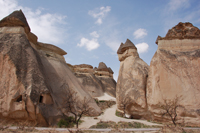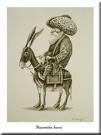Legends passed on by word of mouth
Cici Ahbap - The Clairvoyant
from Uçhisar, Cappadocia
Fairy Tales and Legends
from Cappadocia

The Residence of
the Gods - Argeus
The Legend of Mahsen
Donation from the Vizier
The Clairvoyant
Jinns and Fairies
The Muhtar of Uçhisar
An Extraordinary Discovery
The Test of Strength
A Musical Contest
Hacı Bektas
The Wise Dervish
Memories of the Village Elders
Stories of their life

Fairy Tales from Turkey
Nasreddin Hoca - Anekdotes

Cici Ahbap - The Clairvoyant of Uçhisar
 "Cici Ahbap, nasılsınız bugün?" He always greeted people thus, with the question “How are you today?” but it was more his attractive smile than the words which made the day of the person he was addressing.
"Cici Ahbap, nasılsınız bugün?" He always greeted people thus, with the question “How are you today?” but it was more his attractive smile than the words which made the day of the person he was addressing.
“Cici Ahbap,” if it can be translated, is “Sweet Friend” and that was how the people of Uçhisar saw him. Born in 1902 in Yukarı Mahalle of Uçhisar, he grew up with his family and was taught to be a hafiz, somebody who memorizes and is able to recite all the verses of the Koran by heart. Both his father and his grandfather had been hafız and they were his teachers.
Many people in Uçhisar went to see him to ask questions about religion, which he tried to answer more with human understanding and common sense than with the strict words and rules of the Koran. What made him really different, however, was his appearance, and his special gift of clairvoyance. Cici Ahbap was what is called “ermiş”, a saint or one who has attained spiritual perfection.
He is remembered as wearing long, wide dress, with a sash tied around his waist, a waistcoat or short jacket on top and a hat or a turban wound around his head. It was usual to wear such clothes many years ago, but in the 20th century elicited surprise, since he was the only one dressed like this. His hair and long beard as he is remembered last, were white.
When people who knew him talk about him today, an immediate change comes over their faces and eyes. "He was always laughing and smiling," they say, and when they say these words and remember him they smile, too. Even nowadays nobody says he was funny or a comic old man. He was taken seriously and was much respected.
Cici Ahbap was hardly ever found sitting in his house. During the day he would stroll around in the village, talking with people he met here and there, giving sweets or leblebi (roasted chickpeas) to children, visiting the tea garden or the coffee house. He never stayed very long but greeted everybody politely, exchanged a couple of words here and there and he left again for another stroll. Families invited him to share their meal with him or have tea just for the joy of talking and listening to him.People would often ask him "Cici Ahbap, how will the weather be tomorrow?" He would smile, and with a look up at the sky he would answer. It is still said and strongly believed that his predictions would turn out to be true. It is also said that he was able to tell the names of people he had never met before. There have been many more instances when he could predict the future. Those who claim this, however, are too hesitant to tell us what exactly was predicted. They answer my probing questions with a shy smile and a knowing glance.
If there is such a thing as constant good luck, Cici Ahbap had it and it was a pleasure for him to share it with others.It is said that he would visit all the shops, not only in Uçhisar, as well as in Nevşehir and the area around. He was always a very welcome visitor there. He never said much; he would just wish everybody a good day and leave again. The arrival of Cici Ahbap meant good business for the shopkeepers. They remember that after his visit, their sales would invariably increase. They would give him small gifts to thank him for having dropped by, but he would always give them away.
These were not the most important gifts that he would give away, however. The really important ones were his good will, his knowledge, advice, happiness, and most important, the good fortune that seemed to come to others through him.
When Cici Ahbap died in 1974, the villagers erected a small mausoleum where he is buried in the centre of the graveyard outside the village, surrounded by the other plain tombstones of the huge burial ground.On the day of his death, Cici Ahbab was 72 years old.
He had become a legend and will not be forgotten, the ”nice friend” and Clairvoyant of Uçhisar.